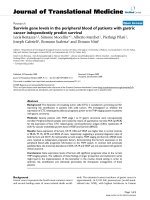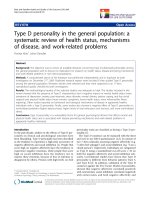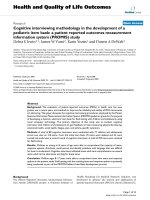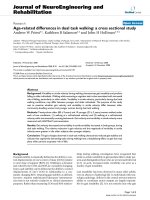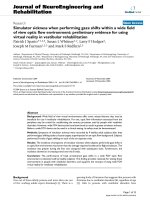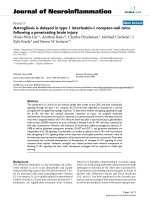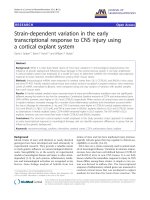báo cáo hóa học: " Type D personality in the general population: a systematic review of health status, mechanisms of disease, and work-related problems" docx
Bạn đang xem bản rút gọn của tài liệu. Xem và tải ngay bản đầy đủ của tài liệu tại đây (239.45 KB, 10 trang )
REVIEW Open Access
Type D personality in the general population: a
systematic review of health status, mechanisms
of disease, and work-related problems
Floortje Mols
*
, Johan Denollet
Abstract
Background: The objective was to review all available literature concerning Type D (distressed) personality among
the general population and to discuss its implications for research on health status, disease-promoting me chanisms
and work-related problems in non-clinical populations.
Methods: A computerized search of the literature was performed independently and in duplicate by both
investigators on December 21
st
, 2009. Published research reports were included if they studied Type D personality
among the general population. Nineteen articles were selected and they were subjected to an 11-item
standardised quality checklist by both investigators.
Results: The methodological quality of the selected studies was adequate to high. The studies included in this
review showed that the presence of Type D characteristics had a negative impact on mental health status (more
symptoms of depression, anxiety, post-traumatic stress disorder, mental distress, passive coping, and less social
support) and physical health status (more somatic complaints, lower health status, more influenza-like illness
reporting). Other studies reported on behavioral and biological mechanisms of disease in apparently healthy
individuals with a Type D personality. Finally, some studies also showed a negative effect of Type D personality on
work-related problems (higher absence-leave, highe r levels of vital exhaustion and burnout, and more work-related
stress).
Conclusions: Type D personality is a vulnerability factor for general psychological distress that affects mental and
physical health status and is associated with disease-promoting mechanisms and work-related problems in
apparently healthy individuals.
Introduction
In the past decade, studies on the effects of Type D per-
sonality on clinical and psychological outcomes have
been flourishing. Type D personality has been described
as the tendency to experie nce a high joint occurrence of
negative affectivity and social inhibition [1]. People that
score high on negative affectivity have the tendency to
experience negative emotions, while people that score
high on social inhibition have the tendency not to
express these emotions, because of fear of rej ection or
disapproval by others. Persons with high levels on both
personality traits are classified as having a Type D per-
sonality [1].
The Type D construct can be measured with the short
and easy-to-use DS14 questionnaire [1,2]. It consists of
two 7-item subscales assessing negative affectivity (e.g.
“I often feel unhappy”) and social inhibition (e.g. “Iama
closed person”) respectively. Individuals are categorized
as Type D using a standardized cut-off score ≥ 10 on
both the negative affectivity and social inhibition sub-
scales. Correlational studies have shown that Type D
personality is different from behavior patterns Type A
and Type B [2]. In addition, validation of the Type D
construct against the Five Factor Model of personality,
showed that negative affectivity correlated positively
with neuroticism, social inhibition correlated negatively
with extraversion, and both negative affectivity and
* Correspondence:
CoRPS - Center of Research on Psychology in Somatic Diseases, Department
of Medical Psychology, Tilburg University, The Netherlands
Mols and Denollet Health and Quality of Life Outcomes 2010, 8:9
/>© 2010 Mols and Denollet; licensee BioMed Ce ntral Ltd. This is an Open Access article distributed under the terms of the Creative
Commons Attribution License (http://cr eativecommon s.org/licenses/by/2.0), whic h permits unrestricted use, di stribution, and
reproduction in any medium , provided the original work is properly cited.
social inhibition correlated negatively with conscien-
tiousness [1].
ThemajorityofstudiesonTypeDpersonalityhave
focused on its prevalence and effects in patients with a
variety of cardiovascular diseases since the Type D
construct was originally described and further devel-
oped in this patient group [3]. These studies in cardio-
vascular patients have show n that Type D personality
is an independent predictor of negative health out-
comes such as poor health status, (recurrent) myocar-
dial infarction, and increased risk of mortality [4-7].
Given the clinical relevance of findings on Type D
research in the context of cardiovascular disorders, it
is also important to assess the potential relevance of
the Type D construct among apparently h ealthy people
from the general population.
Although Type D personality has been shown to pre-
dict cardiac prognosis after adjustment for clinical mar-
kers of disease severity [4,7], there still is a possibility
that markers of disease severity that were not controlled
for might have led t o the occurrence of Type D charac-
teristics in these studies. Studying Type D personality in
apparently healthy people from the general population
wouldprovideamoredirecttestofthenotionthat
Type D is not an epiphenomenon caused by cardiovas-
cular disorder. Moreover, Type D personality is based
on normal personality traits rather than p sychopathol-
ogy which implies that it should be prevalent in the gen-
eral population as well [1], and that it may have an
adverse effect on the perceived health status as reported
by individuals from the general population.
Recently, a number of studies have been published on
the effect of Type D p ersonality in different subgroups
from the general population. The primary aim of the
present study was to review all the available evidence
concerning Type D personality in relation to mental and
physical health status among apparently healthy people
from the general population. In addition, w e wanted to
review the role of Type D personality in potential
mechanisms of disease as markers of health risks in
apparently healthy people. Finally, we sought to describe
potential work-related problems that are associated with
Type D personality in economically active populations.
Methods
Search strategy
A computerized search of the literature through the
search engines Pubmed, Science Direct, and PsychINFO
was performed on December 21
st
, 2009, using the terms
‘Type D personality’ and ‘Type D’. Reference lists of all
identified publications were checked to retrieve other
relevant publications, which were not identified by
means of the computerized search.
Selection criteria
Studies that met the following criteria were included; (1)
iftheobjectivewastodescribeTypeDpersonalityin
the general population, (2) if the publication was an ori-
ginal article (e.g. no poster abstracts, letters to the editor
etc.), (3) if they were published in peer-review journals,
and (4) if they were written in English. Studies were
excluded for the following reasons; (1) if they included a
patient population, and (2) if they only reported results
on negative affectivity or social inhibition instead of
Type D. The literature search wa s conducted indepen-
dently and in duplicate by both investigators.
The described inclusion and exclusion criteria were
applied to our initial 567 hits. Based on their titles and
abstracts 21 articles met our criteria. These studies were
conducted between 2002 and 2009. Hard copies were
obtained of 21 studies and were reviewed by both investi-
gators. After careful review, 19 articles fulfilled our selec-
tion criteria and were included in this review [8-26]. A
flow-chart of this selection procedure is shown in Figure 1.
Quality assessment
The methodological quality of each of the selected arti-
cles was assessed with an 11-item standardised checklist
of predefined criteria by both investigators. The check-
list was based on established criteria lists for systematic
reviews [27,28]. The criteria are presented in Table 1.
Each item of a selected study, that matched our cri-
teria, received one point. If an item did not meet our
criteria or was described insufficiently or not at all, zero
points were assigned. The highest possible score was
thus 11. Studies scoring 75% or more of the maximum
attainable score (= 8 points) were arbitrarily considered
to be of ‘high quality’. Studies scoring between 50% and
75% (6-7 points) were rated as ‘adequate quality’. Studies
scoring lower then 50% (i.e. <6 points) were considered
to be of ‘low quality’.
Results
Methodological quality of the studies
The evaluation of the methodological quality of the 19
studies by the two reviewers yielded the following
results. On 5 items, there was disagreement between the
reviewers, mostly due to differences in interpretation.
These were solved through discussion in a consensus
meeting. The quality scores ran ged from 6 to 9 po ints
(Table 2) and the mean quality score was 8. Thirteen
studies were of a high quality although none of the stu-
dies received the maximum attainable score
[8,1 1,12,14-16,18,21- 26]. The remaining six studies con-
tained adequate levels of evidence [9,10,13,17,19,20].
None of the studies was considered to be of low quality
according to our list of quality criteria. General s hort-
comingswerecriteria5(responseratelessthen75%)
Mols and Denollet Health and Quality of Life Outcomes 2010, 8:9
/>Page 2 of 10
and criteria 6 (information on the degree of selection of
the sample).
Study characteristics
All studies were published after 2001. The studied popu-
lations included policemen, nurses, psychiatrists, prison
workers, employees at a manufacturing plant, female
teachers, right-handed males, university students, under-
graduates, youngsters, twins, and respondents from the
general population (Table 2). Because the studies
included children, students, and middle-aged adults, the
age range of participants differed betw een the included
studies. The lowest mean age was 10.7 [13] and the
highest was 54.2 [23]. Most studies included both males
and females.
The most frequently used q uestionnaire to determine
Type D personality was the 14-item DS14 scale
[8,10,12,14,17-21,23-26]. In the other studies the DS16
[16,22] or DS2 4 [9,11] scales were used. One study
assessed social inhibition with the social avoidance and
distress items of the Social Anxiety Scale for Children
andusedtheChildren’s Depression I nventory to assess
negative affect [13]. Another study assessed Type D by a
combination of the Amsterdam Biographical Question-
naire, the Spielberger Trait Anxiety Inventory and the
Young Adult Self-Report [15]; after the combination of
scales method, 20 items were selected and used to
determine Type D status.
Whereas the majority of publications on Type D per-
sonality among patients with cardiovascular diseases ori-
ginate from the Center of Research on Psychology in
Somatic diseases (CoRPS) at Ti lburg University, the
Netherlands, only 6 studies in the present review origi-
nated from CoRPS and 13 studies on Type D in the
general population were performed by other research
groups. The studies were conducted in populations from
8 different countr ies: Netherlands (n = 8), United King-
dom (n = 4), Belgium (n = 3), Germany (n = 2), Canada,
Ireland, Poland, and Ukraine.
The results of the studies included in this review are
first described below according to the impact of Type D
personality on m ental and physical health status (Table
3). Next, evidence is reviewed regarding the role of
Type D in t he medical (mechanisms of disease in
healthy people) and the occupational (work-related pro-
blems in economically active populations) context
(Table 4). Because some studies included a variety of
outcomes, they are included in more than one category.
Type D personality and health status
Eight studies included in this review reported that Type
D personality was negatively associated with mental
health status (Table 3 - section a). Type D personality
was associated w ith more remembered alienation from
parents and control by parents while growing up [23].
Furthermore, adults with a Type D personality experi-
enced more symptoms of depression and anxiety com-
pared to non-Type D adults [9,18,23], and they reported
significa ntly more negative affect and less p ositive affect
compared to non-Type D’ s [18]. In a ddition, children
with a Type D personality reported more negative mood
states and more non-productive thoughts than non-
Type D children [13]. Moreover, individuals with a Type
D personality manifested significantly more sympto ms
of mental health disorders [17], had more symptoms of
mental distress [24], and exhibited higher feelings of
subjective stress than non-Type D individuals [25]. Indi-
viduals with a Type D personality also tend to use more
passive and maladaptive avoidance coping strategies
which is associated with higher levels of perceived stress
and burnout symptoms [19]. Finally, Type D individua ls
reported lower levels of social support, and they were
21 articles
potential applicable. Hard copies were
obtained for more detailed evaluation of our selection
criteria.
After applying our selection criteria to the hard copies, 19
articles were selected and were finally included in this
review.
548 articles excluded due to selection
criteria and removal of duplicate articles*
Computerised search of databases and reference checking.
567 hits
Figure 1 Flow diagram of papers accepted and rejected during selection procedure. * The selection criteria are described in the methods
section.
Mols and Denollet Health and Quality of Life Outcomes 2010, 8:9
/>Page 3 of 10
more likely to let things get them down compared to
non-Type Ds [26].
Six studies reported results on the effect of Type D
personality on physical health status (Table 3 - section
b). Children with a Type D personality reported more
somatic complaints (24 vs. 18; p < 0.05) compared to
non-Type D children [13]. Adult men and women with
aTypeDpersonalityalsoreportedasignificantlylower
health status compared to non-Type D’s [9,23]. Another
study reported that negative affectivity was associated
with more influenza-like illness reporting while social
inhibition was associated with less influenza-like illness
reporting [21]. Finally, female teachers with a Type D
personalityweremorebotheredbytheirvoicecom-
plaints [22] and reported a higher biopsychosocial
impact of their voice complaints [16] than their non-
Type D counterparts.
Apart from Type D personality and perceived health
status, we al so reviewed empirical and experimental evi-
dence regarding the role of Type D personality in poten-
tial mechanisms of disease as well as work-related
problems in apparently healthy individuals from the
general population.
Type D personality and mechanisms of disease
Six studies examined behavioral and biological mechan-
isms of disease as a function of Type D personality in
apparently health individuals (Table 4 - section a).
Regarding behavioral mechanisms, two studies showed
that Type D personality was associ ated a decreased like-
lihood of getting approp riate medical care. Female Type
D teachers with r ecent voice complaints seek out less
(para-)medical care and were less likely to have under-
gone a treatment for their complaints than their non-
Type D counterparts [22]. In another study, Type D
individuals were less likely t o have a regular medical
check-up [26]. In the latter study, Type D was also asso-
ciated with an unhealthy lifestyle; i.e., Type D indivi-
duals were less likely to eat sensibly or to spend time
outdoors compared to non-Type Ds [26]. Finally, a
recent study showed that body dissatisfaction was more
prevalent in men with a Type D personality and in men
who are sedentary [8]. The interaction between Type D
personality and being sedentary is detrimenta l to health
because it can influence health risk behaviors.
Biological mechanisms of disease in Type D research
among healthy populations included the cardiovascular
system, emotion-processing in the brain, and heritability.
Men with a Type D personality, but not women, exhib-
ited higher cardiac output d uring experimental stress
compared to non-Type D men [25]. Another study
showed that socially inhibited men had heightened sys-
tolic and diastolic blood pressure reactivity, while nega-
tive affectivity was related to dampened heart rate
reactivity [11]. Type D was also associated with a differ-
ential activity of the amygdala in react ion to fearful ver-
sus neutral fa ce and body expressions. Emotion-evoked
activation of the amygdala was present in non-Type D’s
but was absent in Type D individuals [10]. F inally, evi-
dence suggests that Type D personality may be substan-
tially heritable; heritability has been estimated to be 52%
[15]. Heritability for negative affectivity was 46% due to
additive genetic factors, while heritability for social inhi-
bition was 50% due to nonadditive or dominance genetic
effects [15].
Type D personality and work-related problems
Associations between Type D personality and impaired
health status may also have an impact on health pro-
blems in the occupational setting. Four studies reported
that a Type D personality was associated with work-
related problems (Table 4 - section b). With reference
to this issue, Type D personality has been associated
with effort-reward imbalance, overcommitment, per-
ceived adverse physical working conditions, and sub-
stantial problems in interactions with s upervisors and
co-workers [12]. Importantly, this study also showed
Table 1 List of criteria for assessing the methodological
quality of studies on the relationship between Type D
personality and the general population.
Positive if with
respect to:
Type D assessment
1. A validated Type D questionnaire is used (e.g.
DS16, DS24 or DS14)
2. The correct method of calculating Type D is used
(e.g. as described in the publications associated
with the Type D questionnaires)
Study population
3. A description is included of at least two socio-
demographic variables
4. Inclusion and/or exclusion criteria are described
5. Participation rates for patient groups are described
and are more than 75%
6. Information is given about the degree of selection
of sample (information is given about the ratio
respondents versus non-respondents).
Study design
7. The study size is consisting of at least 50
participants (arbitrarily chosen)
8. The collection of data is prospectively gathered
9. The process of data collection is described (e.g.
interview or self-report)
Results
10. The results are compared between two groups or
more (e.g., Type D vs. non-Type D, groups with
different gender or age etc.)
11. Statistical proof for the findings is reported
Mols and Denollet Health and Quality of Life Outcomes 2010, 8:9
/>Page 4 of 10
Table 2 Characteristics of studies*
Study Country Size
sample
Participants Mean age in
years
Sex % Type
D
Design Research
group
Study
quality
[8] U.K. 564 British males M = 26.2
R = 18-55
564 men 29% Cross-
sectional
Other 8
[9] Belgium 155 policemen and nurses M = 32
R = 20 - 56
66 men
85 women
35.5% Cross-
sectional
CoRPS 7
[10] Netherlands 17 right-handed men M = 23
SD = 2.4
17 men
no women
23.5% Cross-
sectional
CoRPS 6
[11] Canada 173 university students M = 20.4 86 men
87 women
Unknown Prospective Other 9
[12] Germany 492 employees at
manufactory
M = 40.5
SD = 11.4
438 men
54 women
Unknown Cross-
sectional
Other 9
[13] Netherlands 668 children M = 10.3
R = 8.6 - 12.8
368 boys
300 girls
27.5% Prospective Other 7
[14] Netherlands 151 prison workers M = 44.0
R = 22 - 59
111 men
40 women
16.6% Cross-
sectional
Other 8
[15] Netherlands 3331 healthy twins M = 17.2
R = 12 - 24
1519 men
1812
women
26.7% Cross-
sectional
CoRPS 8
[16] Netherlands 755 student teachers M = 18.8
R = 16-29
No men
755
women
25.9% Cross-
sectional
Other 9
[17] Poland 79 psychiatrists and
nurses
M = 39.7
S = 8.2
25 men
28 women
27.8% Cross-
sectional
Other 6
[18] Ukraine 250 university students M = 20.9
SD = 3.4
113 men
137
women
22.4% Prospective CoRPS 9
[19] U.K. 334 university students M = 19.5
R = 18-41
180 men
154
women
24.9% Cross-
sectional
Other 7
[20] Germany 634 employees at
manufactory
M = 39.9
SD = 10.7
575 men
67 women
Unknown Cross-
sectional
Other 7
[21] Netherlands 5404 adults M = 45.8
SD = 15.9
2697 men
2707
women
Unknown Prospective CoRPS 9
[22] Belgium/
Netherlands
932 female teachers M = 25
IQR = 19-42
no men
932
women
28.4% Cross-
sectional
Other 8
[23] Netherlands 622 adults M = 54.2
SD = 14
318 men
304
women
18.1% Cross-
sectional
CoRPS 8
[24] Belgium 132 adults M = 33.7
SD = 14.5
70 men
57 women
Unknown Cross-
sectional
Other 9
[25] U.K. 84 adults M = 22.0
SD = 6.8
42 men
42 women
Unknown Prospective Other 9
[26] U.K./Ireland 1012 adults M = 20.5
SD = 4.8
225 men
787
women
38.5% Cross-
sectional
Other 8
* In alphabetical order
R = range; SD = standard deviation; IQR = interquartile range; CoRPS = Center of Research on Psychology in Somatic Diseases; Other = other research group not
related to CoRPS.
Mols and Denollet Health and Quality of Life Outcomes 2010, 8:9
/>Page 5 of 10
that employees with a Type D personality were more
often absent from work than their non-Type D counter-
parts [12]. A possible explanation for this higher rate of
sick-leave is the fact that employees with a Type D per-
sonality are more likely to report symptoms of vital
exhaustion [20], and perceive their workplace as more
stressful [17]. Employees with a Type D personality also
have higher le vels of burnout, and show a lower sense
of personal accomplishment [17]. Type D employ ees
maybeupto9timesmorelikelytodeveloppost-trau-
matic stress disorder than non-Type D’ s, especially
when they are confronted with significant stressors at
work [14].
Conclusions
Although the majority of studies on Type D personality
has focussed on cardiovascular [1,3-7,29-34], or other
medical populations [35], th is systematic review indi-
cates that Type D may negatively affect health status of
apparently healthy individuals from the general popula-
tion as well.
First, the studies included in this review showed that
the presence of Type D personality had an adverse effect
on mental health status. Various studies showed that
individuals from the general population with a Type D
personality experienced more symptoms of distress,
depression and anxiety compared to non-Type D’ s
[9,13,18,19,23-25]. This increased vulnerability for men-
tal health problems in Type D individuals was also
found in chronic pain patients [36], diabetes patients
[37], and cardiac patients [38]. Furthermo re, the studies
included in this review showed that people with a Type
D personality more often reported mental health disor-
ders [17] as well as lower levels of social support [26]
compared to non-Type D adults.
ThepresenceofTypeDpersonalityamongpeople
from the general population was also associated with a
poor physical health status. For example, Type D’ s
reported more somatic complaints [13,16,22] and a sig-
nificantly lower hea lth status compared to non-Type D’s
[9,23]. This is in line with the adverse effects of Type D
on somatic health status in cardiovascular conditions. In
patients with heart failure, it was found that Type D
personality was an independent predictor of impaired
health status [39] and more cardiac symptoms [40].
Also, Type D patients with heart failure were at 6-fold
increased risk of reporting impaired health status com-
pared to the reference gro up of non-Type D patients
[41]. Finally, Type D was a strong predictor of adverse
cardiac outcome after acute myocardial infarction, and
the associated risk was similar to that of traditio nal car-
diovascular risk factors [7].
Some studies that are included in this review explored
the behavioral and biological mechanisms of disease as a
Table 3 Outcomes of studies: Health status
Outcome Study Participants Conclusion
(3a) Mental
health
status
[23] 622 adults
(Netherlands)
Type D individuals
experienced more
symptoms of depression (r =
0.42; p < 0.01) and anxiety (r
= 0.35; P < 0.01) compared
to non-Type D individuals.
[9] 155
policemen
and nurses
(Belgium)
Type D individuals
experienced more
symptoms of depression (9.1
vs. 7.7; p < 0.01) and anxiety
(14.1 vs. 11.1; p < 0.001)
compared to non-Type D
individuals.
[18] 250 university
students
(Ukraine)
Type D individuals
experienced more
symptoms of depression (p <
0.001), anxiety (p < 0.001),
and negative affect (p <
0.001), as well as less positive
affect (p < 0.001) than non-
Type Ds.
[13] 668 children
(Netherlands)
Children with a Type D
personality reported more
negative mood states (10.43
vs. 6.96) and more non-
productive thoughts (10.15
vs. 5.13) than non-Type D
children.
[17] 79
psychiatrists
and nurses
(Poland)
Individuals with a Type D
personality manifested
significantly more symptoms
of mental health disorders
than non-Type D
individuals.
[24] 132 adults
(Belgium)
Type D individuals had
more symptoms of mental
distress (rs > .38) compared
to non-Type D; Type D has
a more adverse effect with
low levels of
authoritarianism (b = .62; p
< 0.01).
[19] 334 university
students
(U.K.)
Type D’s tend to use more
passive and maladaptive
avoidance coping strategies
such as resignation and
withdrawal. This is
associated with higher
levels of perceived stress
and burnout symptoms.
[25] 84 adults
(U.K.)
In an experimental research
setting, Type D individuals
exhibited higher feelings of
subjective stress compared
to non-Type D individuals (F
(1.83) = 6.43; p < 0.03).
[26] 1012 adults
(U.K. and
Ireland)
Type D individuals reported
lower levels of social support
(12.7 vs. 14.7; p < 0.001),
and they were more likely
to let things get them down
(p < 0.001) compared to
non-Type Ds.
Mols and Denollet Health and Quality of Life Outcomes 2010, 8:9
/>Page 6 of 10
function of Type D personality in apparently health
individuals. Hence, a poor physical health status can be
explained by the fact that Type D individuals perform
significantly fewer health-related behaviors (eat sensibly,
spend time outdoors, get a regular medical check-up)
[26] and that they are more likely to smoke [6] as com-
pared to no n-Type D individuals. Furthermore, two stu-
dies showed that individuals w ith a Type D personality
are less likely to seek appropriate medical care [22,26].
This has also been shown in Type D patients with
chronic heart failure causing a significant decrease in
health status among these patients [41,42].
The fact that Type D individuals tend to experience
interpersonal situations as being stressful may also have
direct biological effec ts that may impact on the cardio-
vascular system. Responding to these situations can eli-
cit physiological reactivityeverytimeapotentially
“threatening” situation is encountered [11]. Accordingly,
Type D was associated with increased cardiac output
[25], heightened systolic and diastolic blood pressure
reactivity [11], and dampened heart rate reactivity dur-
ing experimental stress. Type D was also associated with
a decreased activity in the amygdala in response to fear-
ful expressions [10], suggesting inadequate emotion-pro-
cessing in the brain. Finally, heritability might be an
underlying third variable that explains the co-occurrence
of disease and Type D personality through a shared
genetic c omponent that predispose people to both phy-
sical and psychological distress. In fact, Type D person-
ality has be en shown to be substantially heritable [15]
and research on genetic linkage has provided more evi-
dence for the biological underpinnings of the Type D
construct [43].
Clinical research in cardiac populations confirmed that
Type D personality was independently associated with
indices of cardiovascular reactivity such as reduced
heart rate recovery [44]. Other findings from clinical
research also pointed tow ards neuroendocrine and
immunological pathways that may explain the adverse
health outcomes associated with Type D personality.
Type D personality has been associated with elevated
level s of the stress hormone cortiso l [45], increased oxi-
dative stress [46], immune dysfunction, and decreased
numbers of bone-marrow derived endothelial progenitor
cells [47] in cardiac patients. These initial findings are
promising, but more research is needed to examine the
cardiovascular effects of stress in apparently healthy
individuals with a Type D personality. Hence, future
research should also focus on neuro endocrine and
immunological mechanisms that may advance our
understanding of biological pathways in non-cli nical
populations.
The presence of Type D personality may also be asso-
ciated with health-re lated problems in the occupational
setting. Type Ds were more often absent from work
[12], were more likely to report symptoms of vital
exhaustion [20] or post-traumatic stress disorder [14],
perceived their workplace as more stressful, ha d higher
levels of burn out, and showed a lower sense of personal
accomplishment [17] than non-Type D’s. To our knowl-
edge, only one other study investigated the relationship
between work and Type D personality in patients with
an acute coronary syndrom, and found that failure to
resume work was not related to Type D personality [48].
This review has some limitations. The cross-sectional
nature of most studies (14 out of 19) did not allow us
to determine causal associations between Type D and
the studied outcomes. A prospect ive study might pro-
vide us with more answers about the exact relationship
between Type D personality and spe cific outcomes and
the extent o f this relationship. In addition, the studies
included in this review used a number of different ques-
tionnaires to assess Type D personality. Also, not all
studies used the correct method of calculating Type D.
Table 3: Outcomes of studies: Health status (Continued)
(3b) Physical
health
status
[13] 668 children
(Netherlands)
Children with a Type D
personality reported more
somatic complaints (24 vs.
18; p < 0.05) compare to
non-Type D children.
[23] 622 adults
(Netherlands)
Individuals with a Type D
personality reported a
significantly lower health
status (all ps < 0.01)
compared to non-Type D
individuals.
[9] 155
policemen
and nurses
(Belgium)
Individuals with a Type D
personality reported a
significantly lower health
status (50.4 vs. 42.5; p <
0.001) compared to non-
Type D individuals.
[21] 5404 adults
(Netherlands)
Negative affectivity was
related to more influenza-like
illness reporting (OR = 1.05,
p = 0.009); however, social
inhibition to less influenza-
like illness reporting (OR =
0.97; p = 0.011).
[22] 932 female
teachers
(Belgium and
Netherlands)
Female teachers with a
Type D personality were
more bothered by their voice
complaints (10 vs. 7; p <
0.001) than their non-Type
D counterparts.
[16] 755 student
teachers
(Belgium and
Netherlands)
Type D student teachers
had a 4× greater risk of a
high Voice Handicap
Inventory score (rating the
subjective biopsychosocial
consequences caused by
voice problems) than the
non-Type D group.
Mols and Denollet Health and Quality of Life Outcomes 2010, 8:9
/>Page 7 of 10
Some studies claim to report on the effects of Type D
personality on health but only report on the effects of
social inhibition and negative affectivity on health. Stan-
dardisation of the use of valid Type D questionnaires is
essential f or adequate evaluation and mutual compari-
son of studies. Finally, one study reported on t he effect
of Type D personality in children [13]. Although the
results of this study were similar to the results found in
studies among adults, we need to be careful with draw-
ing conclusions on the association between personality
and health in children, since personality is likely to
change from childhood into adulthood.
This review also has some strengths. It is the first
review that reports about the effects of Type D person-
ality in the general population. Furthermore, all available
literature on the subject matter was systematically
reviewed and we managed to retrieve hard copies of all
articles that fulfilled our selection criteria. Finally, the
methodological quality of each of the selected articles
was assessed with an 11-item standardised checklist of
predefined criteria by both investigators.
The available eviden ce suggests that Type D is a vul-
nerability factor that not only affects people with
medical conditions, but also apparently healthy indivi-
duals from the general population. Consequently, addi-
tional attention is justified for those with a Type D
personality because they are at risk for work-related
problems and a lower mental and physical health status.
Although Type D is a stable construct [49], this d oes
not imply that the individual’s level of distress cannot
be modified. Individuals with a Type D per sonality have
a limited ability to cope adequately with stressful life
events [50], and for this reason may benefit from psy-
chological interventions that are aimed towards improv-
ing their coping skills in order to decrease the acute and
chronic stress that they exper ience and thus to decrease
their work-related problems and increase their mental
and somatic health status. Future intervention trials are
needed to study the exte nt to which interventions are
able to decrease work-related problems and increase
their mental and somatic health status among various
people with a Type D personality.
If anyt hing, this review suggests that Type D personal-
ity is a vulnerability factor for general psychol ogical dis-
tress that may not only affect people with medical
conditions, but also affects the health status of
Table 4 Outcomes of studies: Medical and occupational setting
Outcome Study Participants Conclusion
(4a) Medical:
mechanisms of
disease
[22] 932 female teachers
(Belgium and Netherlands)
Female teachers with a Type D personality were significantly less likely to get
treatment for their voice complaints than their non-Type D counterparts (25.7%
vs. 39.3%; p = 0.016).
[26] 1012 adults
(U.K. and Ireland)
Type D individuals had fewer regular medical checkups (p = 0.027), and were less
likely to eat sensibly (p = 0.033) or to spend time outdoors (p < 0.001) compared
to non-Type Ds.
[8] 564 males
(U.K.)
Body dissatisfaction is more prevalent in Type D’s or in men who are sedentary.
The interaction between Type D and being sedentary is detrimental because it
can influence health risk behaviors
[25] 84 adults
(U.K.)
Men with a Type D personality, but not women, exhibited higher cardiac output
during experimental stress compared to non-Type D men (F[3,37] = 3.4; p <
0.05).
[11] 173 university students
(Canada)
Socially inhibited men had heightened systolic and diastolic blood pressure
reactivity (p < 0.05); negative affectivity was related to dampened heart rate
reactivity in men (p < 0.05).
[10] 17 men
(Netherlands)
The difference in amygdala activity in reaction to fearful vs. neutral face/body
expressions was present in non-Type Ds (p = 0.004) but was absent in Type D
individuals (p = 0.110).
[15] 3331 healthy twins
(Netherlands)
Type D personality was substantially heritable (52%); heritability for negative
affectivity was 46%, while heritability for social inhibition was 50%.
(4b) Occupational: work-
related problems
[12] 492 employees at
manufactory
(Germany)
Employees with a Type D personality were more often absent from work than
their non-Type D counterparts (b = 0.499; p < 0.01).
[20] 634 employees at
manufactory
(Germany)
Employees with a Type D personality were more likely to report symptoms of
vital exhaustion than non-Type Ds (r = 0.574; p < 0.001)
[17] 79 psychiatrists and
nurses
(Poland)
Individuals with a Type D personality perceived their workplace as more stressful
and had a higher level of burnout than non-Type D individuals.
[14] 151 prison workers
(Netherlands)
Type Ds were more at risk for post-traumatic stress disorder than non-Type Ds (OR
9.09; 95%CI = 2.1-39.1; p < 0.005); this risk increased when exposed to inmate
aggression.
Mols and Denollet Health and Quality of Life Outcomes 2010, 8:9
/>Page 8 of 10
individuals from the general population. This review
thereby provides evidence that Type D personality is not
just a state of mind that people develo p in reaction to
the diagnosis of a medical condition, but rather repre-
sents a broad personality co nstruct that is prevalent in a
large subgroup of the general population. Consequently,
it may be an important vulnerability factor to assess in
future studies on work-related problems and mental and
somatic health status in the general population.
Abbreviations
(CoRPS): Center of Research on Psychology in Somatic diseases.
Acknowledgements
This work was supported by a VICI grant [#453-04-004] from the Netherlands
Organization for Scientific Research (The Hague, The Netherlands) awarded
to Johan Denollet.
Authors’ contributions
The concept of this review was designed by JD. After that, both authors
reviewed the available literature and checked the quality of the articles that
were included in this review. FM wrote the first draft of this paper and JD
supervised the writing process. Both authors approved the final version of
this manuscript.
Competing interests
The authors declare that they have no competing interests.
Received: 12 October 2009
Accepted: 23 January 2010 Published: 23 January 2010
References
1. Denollet J: DS14: standard assessment of negative affectivity, social
inhibition, and Type D personality. Psychosom Med 2005, 67(1):89-97.
2. Kupper N, Denollet J: Type d personality as a prognostic factor in heart
disease: assessment and mediating mechanisms. J Pers Assess 2007,
89(3):265-276.
3. Denollet J: Personality, emotional distress and coronary heart disease.
Eur J Pers 1997, 11:343-357.
4. Denollet J, Sys SU, Stroobant N, Rombouts H, Gillebert TC, Brutsaert DL:
Personality as independent predictor of long-term mortality in patients
with coronary heart disease. Lancet 1996, 347(8999):417-421.
5. Denollet J, Vaes J, Brutsaert DL: Inadequate response to treatment in
coronary heart disease: adverse effects of type D personality and
younger age on 5-year prognosis and quality of life. Circulation 2000,
102(6):630-635.
6. Pedersen SS, Lemos PA, van Vooren PR, Liu TK, Daemen J, Erdman RA,
Smits PC, Serruys PW, van Domburg RT: Type D personality predicts death
or myocardial infarction after bare metal stent or sirolimus-eluting stent
implantation: a Rapamycin-Eluting Stent Evaluated at Rotterdam
Cardiology Hospital (RESEARCH) registry substudy. J Am Coll Cardiol 2004,
44(5):997-1001.
7. Martens EJ, Mols F, Burg MM, Denollet J: Type D personality predicts
clinical events after myocardial infarction, above and beyond disease
severity and depression. J Clin Psychiat 2009.
8. Borkoles E, Polman R, Levy A: Type-D personality and body image in
men: The role of exercise status. Body Image 2009.
9. De Fruyt F, Denollet J: Type D personality: A Five Factor Model
perspective. Psychol Health 2002, 17(5):671-683.
10. de Gelder B, Riet van de WA, Grezes J, Denollet J: Decreased differential
activity in the amygdala in response to fearful expressions in Type D
personality. Neurophysiol Clin 2008, 38(3):163-169.
11. Habra ME, Linden W, Anderson JC, Weinberg J: Type D personality is
related to cardiovascular and neuroendocrine reactivity to acute stress. J
Psychosom Res 2003, 55(3):235-245.
12. Hanebuth D, Meinel M, Fischer JE: Health-related quality of life,
psychosocial work conditions, and absenteeism in an industrial sample
of blue- and white-collar employees: a comparison of potential
predictors. J Occup Environ Med 2006, 48(1):28-37.
13. Jellesma FC: Health in Young People: Social Inhibition and Negative
Affect and Their Relationship with Self-Reported Somatic Complaints. J
Dev Behav Pediatr 2008, 29(2):94-100.
14. Kunst MJ, Bogaerts S, Winkel FW: Peer and inmate aggression, Type D
personality and post-traumatic stress among Dutch prison workers.
Stress and health 2009.
15. Kupper N, Denollet J, de Geus EJ, Boomsma DI, Willemsen G: Heritability of
type-D personality. Psychosom Med 2007, 69(7):675-681.
16. Meulenbroek LFP, Thomas G, Kooijman PGC, de Jong FICRS:
Biopsychosocial impact of the voice in relation to the psychological
features in female student teachers. Journal of Psychosomatic Research
2010.
17. Oginska-Bulik N: Occupational stress and its consequences in healthcare
professionals: the role of type D personality. Int J Occup Med Environ
Health 2006, 19(2):113-122.
18. Pedersen SS, Yagensky A, Smith OR, Yagenska O, Shpak V, Denollet J:
Preliminary Evidence for the Cross-Cultural Utility of the Type D
Personality Construct in the Ukraine. Int J Behav Med 2009, 16(2):108-15.
19. Polman R, Borkoles E, Nicholls AR: Type D personality, stress, and
symptoms of burnout: The influence of avoidance coping and social
support. Br J Health Psychol 2009.
20. Preckel D, von Kanel R, Kudielka BM, Fischer JE: Overcommitment to work
is associated with vital exhaustion. Int Arch Occup Environ Health 2005,
78(2):117-122.
21. Smolderen KG, Vingerhoets AJ, Croon MA, Denollet J: Personality,
psychological stress, and self-reported influenza symptomatology. BMC
Public Health 2007, 7:339.
22. Thomas G, de Jong FI, Kooijman PG, Cremers CW: Utility of the Type D
Scale 16 and Voice Handicap Index to assist voice care in student
teachers and teachers. Folia Phoniatr Logop 2006, 58(4):250-263.
23. Broek Van den KC, Smolderen KG, SS P, Denollet J: Type D personality
mediates the relationship between remembered parenting and
perceived health. Psychosomatics 2009.
24. Van Hiel A, De Clercq B: Authoritarianism is good for you: right-wing
authoritarianism as a buffering factor for mental distress. European
Journal of personality 2009, 23:33-50.
25. Williams L, O’Carroll RE, O’Connor RC: Type D personality and cardiac
output in response to stress. Psychology and Health 2008.
26. Williams L, O’Connor RC, Howard S, Hughes BM, Johnston DW, Hay JL,
O’Connor DB, Lewis CA, Ferguson E, Sheehy N, Grealy MA, O’Carroll RE:
Type-D personality mechanisms of effect: The role of health-related
behavior and social support. J Psychosom Res 2008, 64(1):63-69.
27. Mols F, Vingerhoets AJ, Coebergh JW, Poll-Franse van de LV: Quality of life
among long-term breast cancer survivors: A systematic review. European
Journal of Cancer 2005, 41(17):2613-2619.
28. Den Oudsten BL, Van Heck GL, De Vries J: Quality of life and related
concepts in Parkinson’s disease: a systematic review. Mov Disord 2007,
22(11):1528-1537.
29. Pedersen SS, Denollet J:
Type D personality, cardiac events, and impaired
quality of life: a review. Eur J Cardiovasc Prev Rehabil 2003, 10(4):241-248.
30. Denollet J, Sys SU, Brutsaert DL: Personality and mortality after myocardial
infarction. Psychosom Med 1995, 57(6):582-591.
31. Pedersen SS, Denollet J: Validity of the Type D personality construct in
Danish post-MI patients and healthy controls. J Psychosom Res 2004,
57(3):265-272.
32. Aquarius AE, Denollet J, Hamming JF, De Vries J: Role of disease status
and Type D personality in outcomes in patients with peripheral arterial
disease. Am J Cardiol 2005, 96(7):996-1001.
33. Pedersen SS, Denollet J: Is Type D personality here to stay? Emerging
evidence across cardiovascular disease patient groups. Current Cardiology
Reviews 2006, 2:205-213.
34. Denollet J, Schiffer AA, Kwaijtaal M, Hooijkaas H, Hendriks EH,
Widdershoven JW, Kupper N: Usefulness of Type D personality and
kidney dysfunction as predictors of interpatient variability in
inflammatory activation in chronic heart failure. Am J Cardiol 2009,
103(3):399-404.
35. Mols F, Denollet J: Type D personality among non-cardiovascular patient
populations: A systematic review. General Hospital Psychiatry 2010,
32:66-72.
Mols and Denollet Health and Quality of Life Outcomes 2010, 8:9
/>Page 9 of 10
36. Barnett MD, Ledoux T, Garcini LM, Baker J: Type D Personality and chronic
pain: Construct and concurrent validity of the DS14. J Clin Psychol Med
Settings 2009, 16(2):194-199.
37. Simson U, Nawarotzky U, Porck W, Friese G, Schottenfeld-Naor Y, Hahn S,
Scherbaum WA, Kruse J: [Depression, anxiety, quality of life and Type D
pattern among inpatients suffering from diabetic foot syndrome].
Psychother Psychosom Med Psychol 2008, 58(2):44-50.
38. Spindler H, Kruse C, Zwisler AD, Pedersen SS: Increased anxiety and
depression in Danish cardiac patients with a Type D personality: Cross-
Validation of the Type D Scale (DS14). Int J Behav Med 2009, 16(2):98-107.
39. Schiffer AA, Pedersen SS, Widdershoven JW, Denollet J: Type D personality
and depressive symptoms are independent predictors of impaired
health status in chronic heart failure. Eur J Heart Fail 2008, 10(9):922-930.
40. Schiffer AA, Denollet J, Widdershoven JW, Hendriks EH, Smith OR: Failure to
consult for symptoms of heart failure in patients with a Type D
personality. Heart 2007, 93(7):814-818.
41. Pelle AJ, Schiffer AA, Smith OR, Widdershoven JW, Denollet J: Inadequate
consultation behavior modulates the relationship between Type D
personality and impaired health status in chronic heart failure. Int J
Cardiol 2009.
42. Schiffer AA, Denollet J, Widdershoven JW, Hendriks EH, Smith OR: Failure to
consult for symptoms of heart failure in patients with a type-D
personality. Heart 2007, 93(7):814-818.
43. Ladwig K, Emeny R, Gieger C, Ruf E, Klopp N, Illig T, Meitinger T,
Wichmann H: Single nucleotide polymorphisms associations with Type D
personality in the general population: findings from the KORA K-500-
Substudy. APS: 2009: Psychosomatic med 2009.
44. von Kanel R, Barth J, Kohls S, Saner H, Znoj H, Saner G, Schmid JP: Heart
rate recovery after exercise in chronic heart failure: Role of vital
exhaustion and type D personality. J Cardiol 2009, 53(2):248-256.
45. Molloy GJ, Perkins-Porras L, Strike PC, Steptoe A: Type D personality and
cortisol in survivors of acute coronary syndrome. Psychosom Med 2008,
70(8):863-868.
46. Kupper N, Gidron Y, Winter J, Denollet J: Association between type D
personality, depression, and oxidative stress in patients with chronic
heart failure. Psychosom Med 2009, 71(9):973-980.
47. Van Craenenbroeck EM, Denollet J, Paelinck BP, Beckers P, Possemiers N,
Hoymans VY, Vrints CJ, Conraads VM: Circulating CD34+/KDR+ endothelial
progenitor cells are reduced in chronic heart failure patients as a
function of Type D personality. Clin Sci (Lond) 2009, 117(4):165-172.
48. Bhattacharyya MR, Perkins-Porras L, Whitehead DL, Steptoe A: Psychological
and clinical predictors of return to work after acute coronary syndrome.
Eur Heart J 2007, 28(2):160-165.
49. Martens EJ, Kupper N, Pedersen SS, Aquarius AE, Denollet J: Type D
personality is a stable taxonomy in post-MI patients over an 18-month
period. J Psychosom Res 2007, 63(5):545-550.
50. Doering LV, Dracup K, Caldwell MA, Moser DK, Erickson VS, Fonarow G,
Hamilton M: Is coping style linked to emotional states in heart failure
patients?. J Card Fail 2004, 10(4):344-349.
doi:10.1186/1477-7525-8-9
Cite this article as: Mols and Denollet: Type D personality in the general
population: a systematic review of health status, mechanisms of
disease, and work-related problems. Health and Quality of Life Outcomes
2010 8:9.
Publish with BioMed Central and every
scientist can read your work free of charge
"BioMed Central will be the most significant development for
disseminating the results of biomedical research in our lifetime."
Sir Paul Nurse, Cancer Research UK
Your research papers will be:
available free of charge to the entire biomedical community
peer reviewed and published immediately upon acceptance
cited in PubMed and archived on PubMed Central
yours — you keep the copyright
Submit your manuscript here:
/>BioMedcentral
Mols and Denollet Health and Quality of Life Outcomes 2010, 8:9
/>Page 10 of 10


